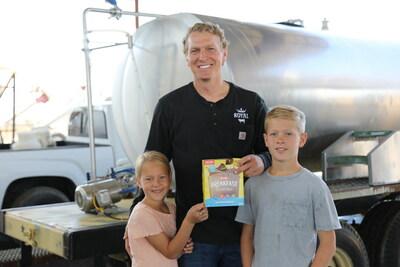Nestlé Partners with Royal Dairy Farm To Reduce Greenhouse Gas Emissions
Nestlé Health Science has announced a collaborative venture with Royal Dairy farm in Washington state, in the US, to help reduce greenhouse gas emissions through climate-smart farming practices.

Austin Allred, founder of Royal Dairy and his family
Royal Dairy aims to assist farms to prevent the formation of greenhouse gases while boosting the capacity of soil to draw down and sequester atmospheric carbon.
Royal Dairy and Nestlé Health Science said they are aligned on four key areas of environmentally-focused innovation, including cow feed, manure management, renewable energy, and regenerative agriculture.
Royal Dairy
Austin Allred (pictured) and his family purchased Royal Dairy in 2016. Raised and trained as a fruit and vegetable farmer, Allred and his family utilise nutrient-rich manure to improve soil health, which grows feed for cows more efficiently.
The farm’s 10,000 cows produce more than one million gallons of milk per month.
Carnation Breakfast Essentials
Royal Dairy joins Nestlé Health Science’s group of dairy suppliers for Carnation Breakfast Essentials nutritional powder drink mix, which is available at national retailers
According to Nestlé, Carnation Breakfast Essentials Original Nutritional Powder Drink Mix provides 13 grams of protein when prepared with one cup of skim milk – the equivalent of two large eggs.
In addition, the product features key nutrients for immune and bone health, including vitamin C, vitamin D, and calcium.
Net Zero Initiative
The Nestlé Health Science and Royal Dairy collaboration is a part of the Dairy Scale for Good pilot, which seeks to promote practices and technologies that are sustainable, feasible, and economically viable on a commercial dairy farm.
This pilot is a key pillar of the US Dairy Net Zero Initiative, which advances research, on-farm pilots and new market development, as an essential first phase to make sustainability practices more accessible and affordable to farms of all sizes and accelerate progress toward the industry’s 2050 environmental goals.
Related news
Danone spends $65M to increase coffee and creamer production
The International Delight and STōK Cold Brew Coffee maker is…
Read more >Oatly’s new strategy for boosting demand for plant-based milk in the US
Oatly plans to give new impetus to the plant-based milk…
Read more >Soccer star David Beckham launches honey-based fruit snacks brand
Beeup gives consumers a natural energy boost free from GMOs…
Read more >Related news
What makes us add the product to the cart – research
The latest joint research by PwC and Publicis Groupe Hungary…
Read more >Energy drinks are now legal: what every shopkeeper should know
New regulations on the sale of energy drinks came into…
Read more >Tens of millions with one opening tab – the biggest prize draw in XIXO history has started
This summer, XIXO is preparing for a bigger launch than…
Read more >






